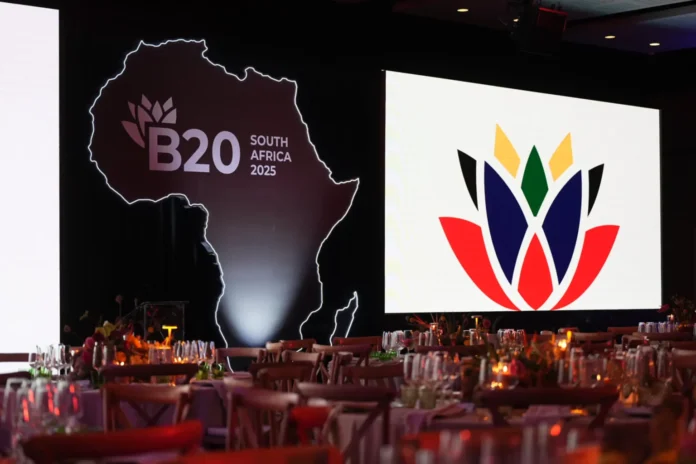South Africa’s mining leadership is calling for a more grounded approach to the energy transition, arguing that decarbonisation must unfold in a way that protects industrial capacity, secures investment, and avoids deepening socio-economic fragilities.
Speaking at the Business 20 (B20) engagements ahead of the G20 Summit, mining executives said the transition must recognise Africa’s development realities, the scale of capital required, and the strategic importance of mining to the global clean-energy supply chain.
Minerals Council SA CEO, Mzila Mthenjane, warned that South Africa will struggle to attract long-term capital unless the state offers predictable policy and stable mining rights. He argued that the country cannot seize its critical-minerals advantage without clear frameworks for exploration, permitting, and fiscal stability. “We need long-term certainty to invest at the scale required. Without that, Africa risks missing the upside of the global transition,” he said.
Premature shift from fossil fuels unwise
Mining leaders also emphasised the importance of sequencing. Sasol CEO, Simon Baloyi, reiterated that a poorly coordinated shift away from fossil fuels could trigger premature deindustrialisation, job losses, and collapsing demand across supply chains. For a country where mining underpins export earnings, tax revenue, and employment in entire towns, the message is straightforward: the transition must protect livelihoods as much as it pursues climate goals.
The sector has already begun decarbonising, with mining houses building large-scale renewable plants, investing in green-fuel pilots, and electrifying fleets. According to the Minerals Council of South Africa, mining companies are implementing around 15,800 MW of renewable energy initiatives (mostly solar and wind) for their own operations, backed by over R275 billion of planned investment. Yet, persistent structural barriers, especially grid capacity and transmission constraints, slow down progress. Executives argued that even well-capitalised companies cannot fully pivot to clean power if national infrastructure remains outdated or congested.
Africa’s energy transition goal
The mining sector’s call for a more nuanced energy transition is echoed across the continent. According to the International Monetary Fund (IMF), Sub-Saharan Africa holds roughly 30% of the world’s proven critical mineral reserves, such as copper, lithium, vanadium, and manganese. United Nations Trade and Development data further shows that Africa accounts for 48.1% of global cobalt reserves and 47.7% of manganese reserves. However, many jurisdictions lack the strict regulatory and exploration pipelines needed to convert geological promise into economic value. Mining leaders say addressing these governance gaps is essential not only for South Africa but for Africa’s position in global green supply chains.
However, while industry leaders highlight investment risks and competitiveness, civil society and mining-affected communities offer a contrasting view. They argue that “realism” must include the lived experience of communities that have carried the costs of mining for decades.
Communities advocate for beneficiation
Civic groups across Limpopo, Mpumalanga and the Eastern Cape are pushing for community-owned renewable-energy projects that move beyond traditional corporate-led models. For instance, the Sekhukhune Combined Mining-Affected Communities (SCMAC) and Climate Justice Coalition (CJC) want social-ownership structures, such as community solar farms, local energy cooperatives, and revenue models that reinvest profits in basic services such as clinics, schools, and water systems. These groups warn that a transition dominated by mining houses risks replicating historic extraction patterns under a “green” label.
Meanwhile, the Centre for Environmental Rights, groundWork and Just Share say the closure of coal mines without comprehensive rehabilitation plans and livelihood alternatives, deepens inequality and places disproportionate strain on women, who depend heavily on land and water resources.
Mining executives are focused on investment certainty, competitiveness, and industrial sequencing. Communities and civil society are focused on ownership, justice, and historical redress. Both camps agree that jobs and social stability must be central, but they diverge on who should lead and who should benefit.
As the G20 cycle moves forward, mining leaders may shape the investment narrative. But communities are reshaping the justice narrative, and in the long-term, the country will need both to build a transition that is credible, inclusive, and investable.
Visit SW YouTube Channel for our video content



